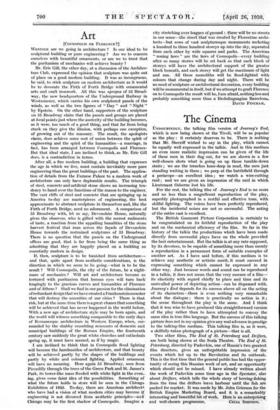The Cinema
as the play : it certainly deserves to be.. There is nothing
that Mr. Sherriff wished to say in the play, which cannot be equally well expressed in the talkie. And in this medium an even more realistic impression can be given of the life of these men in their dug out, for we are shown in a few well-chosen shots what is going on up those tumble-down stairs ; we see the trenches knee-deep in mud, the men just standing waiting in them ; we peep at the battlefield through a periscope—an excellent idea ; we watch a wire-cutting raid ; and we are given an impression of the raid in which Lieutenant Osborne lost his life.
For the rest, the talking film of Journey's End is no more and no less than a magnificent reproduction of the play, superbly photographed in a restful and effective tone, with skilful lighting. The voices have been perfectly reproduced, but the incidental noises are not so successful. The acting of the entire cast is excellent.
The British Gaumont Picture Corporation is certainly to be congratulated on its faithful reproduction of the play and on the mechanical efficiency of the film. So far in the history of the talkie the productions which have been made directly from . successful plays have on the whole provided the best entertainment. But the talkie is at any rate supposed, by its devotees, to be capable of something more than merely' a reproduction in a permanent form of suitable examples of another art. As I have said before, if this medium is to achieve any aesthetic or artistic .merit, it must succeed in expressing something which cannot be expressed in any other way. Just because words and sound can be reproduced in a talkie, it does not mean that the very essence of a film— its elasticity with regard chiefly to place and time and its unrivalled power of depicting action—can be dispensed with. Journey's End depends for its success above all on the acting of its characters—there is even nothing very remarkable about the dialogue ; there is practically no action in it ; same esceidenae in truelanoutthgue play
that it was wise to have produced this straightforward version of the play rather than to have attempted to convey the
apge.Bisutththee ssEuteincees. s of this sItatlkhinking
picture does not in my opinion give any real advance in prestige to the talking-film medium. This talking film is, as it were, a skilfully-taken photograph of a picture—that is all.
Two other films, The End of St. Petersburg and Drifters, are both being shown at the Scala Theatre. The End of St. Petersburg, directed by Pudovkin, one of Russia's two greatest film directors, gives an unforgettable impression of the events which led up to the Revolution and its outbreak. This is the first time that the general public has had the oppor- tunity of seeing this Russian work of art, and an opportunity which should not be missed. I have already written about the work of Pudovkin some time ago in the Spectator, also about Drifters, which tells the whole story of herring-fishing from the time the drifters leave harbour until the fish are packed for market. It was made by Mr. John Grierson for the British Empire Marketing Board, and it is a remarkably interesting and beautiful bit of work. Here is an enterprising and well-chosen programme. CELIA Snn'soN.




































 Previous page
Previous page